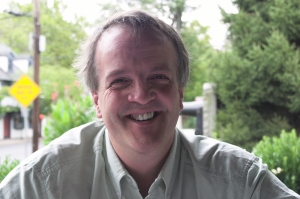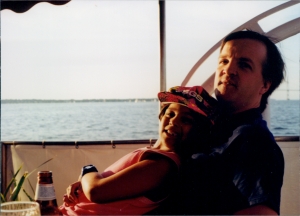They say there are seven stages of grief. Do you buy it?
Shock, denial, bargaining, guilt, anger, depression, hope.
I don’t. I think that this is a self-fulfilling prophecy. If you are expecting to feel a certain way, there’s a pretty good chance that that emotion will manifest itself- but the fact is, everyone copes with loss differently. There are ways that are healthy and there are ways that are less healthy, but not everyone goes through all of those emotions.
Buddhists believe that grief and suffering are inevitable parts of the physical world, and the only way to escape is by maintaining a certain level of distance from attachments. By recognising that life and everything it entails is effervescent, it makes it that much easier to let go when an unexpected loss makes it necessary. This uncertainty also makes it vital to savor every moment, because you truly don’t know which breath will be your last. Your world as you know it can come to a screeching halt in the blink of an eye.
Two years ago tomorrow, I lost someone very close to me. I haven’t cried about it. Does that make me cold and callous, or mean that I didn’t love him? Or does it mean that I’m at peace with the fact that like everything else in the world, people are impermanent? Some people sobbed uncontrollably, some pretended nothing had happened, others didn’t speak at all. All are perfectly valid coping mechanisms- for a little while. I will admit that I didn’t eat for about two weeks and drank more than my fair share of the wine brought by sympathetic friends (which was probably not the healthiest thing), but I never really stopped moving at something close to my usual fast pace.
However, I still fully processed the major life change and cosmic shift that those around me underwent and I began adjusting to new habits. I was not in denial, I never felt guilty about his death, and I never “bargained” (whatever that means). Staying busy by planning a massive celebration and taking on other responsibilities to help fill the void helped me to realise quickly that my life would go on regardless of how I felt, so I might as well participate in it. Having to go back to school for finals, concerts, and juries made that even more clear. Life will not stop for you, and that is definitely not a bad thing.
Of course I miss my dad, especially at a time when my life is going in crazy directions that I couldn’t possibly have ever imagined. But the thing is, grieving won’t solve anything. The best solution is to live enough for both of us and to keep on going even though he’s not around to see what happens next. I wish we could sit and watch The Daily Show and listen to Mozart’s Requiem on car rides to school. I wish he were here so I could tell him about my travels, I wish he had been here to see my senior recital last month. I wish he would come to my graduation in a few weeks and I wish he knew that despite everything, I am graduating summa cum laude after only three years with more credits than most graduate students. I want him to know that we are all not only okay, but thriving.

The last words I spoke to him on the phone were “Thanks for the screwdriver.” This sounds trivial, but anyone who knew my dad would find this incredibly fitting- he always helped everyone with anything they asked and things that they didn’t. Fixing cars, plumbing, rides to the airport, pet-sitting, lending one of his hundreds of tools, just being a friend, you name it and he would be there- the 200+ people that showed up to his memorial service are a testament to how many lives he touched.
I have lots of great memories of my dad- watching the Life of Brian, visiting England, dancing around the house to Sousa marches and ELO alike, his cooking triumphs (and disasters), his reckless driving, his funny faces and astonishing intelligence.
I remember the last time I saw him was outside of my freshman dorm, when he brought me back to school after spending Easter at home. We were on the way back from the dining hall where we had gorged ourselves on cookies and ice cream and it was that fleeting time of day just before the sun begins to set, when the world is shadowy and getting a bit dozy but still has an aura of warmth. We stood next to my bike to say goodbye and he grinned. I indignantly asked why he was so happy to be leaving me, and he said, “It’s nice to see that you’re making a place for yourself in the world.”
Miss you, dad. I hope your next life is just as thrilling and rich as this one was.
 It’s funny how we are conditioned to remember things. I will probably always remember this day as the day my dad died – but despite all my expectations, I have not yet felt any pain on this day. Even the first time three years ago there was no pain – just numbness (and alarm, as my mother’s black eye proved – sorry, mum). Last year I was lucky enough to be with someone who spent the entire day having fun with me. But this year, I was faced with spending the whole day at a yoga studio (meditative by nature) and then the evening in the empty house as my mum and my brother are at Penn State. I was expecting to wake up in a terrible mood, fumble through my teaching, come home, and binge on Indian food while watching Monty Python and old home videos…
It’s funny how we are conditioned to remember things. I will probably always remember this day as the day my dad died – but despite all my expectations, I have not yet felt any pain on this day. Even the first time three years ago there was no pain – just numbness (and alarm, as my mother’s black eye proved – sorry, mum). Last year I was lucky enough to be with someone who spent the entire day having fun with me. But this year, I was faced with spending the whole day at a yoga studio (meditative by nature) and then the evening in the empty house as my mum and my brother are at Penn State. I was expecting to wake up in a terrible mood, fumble through my teaching, come home, and binge on Indian food while watching Monty Python and old home videos…

